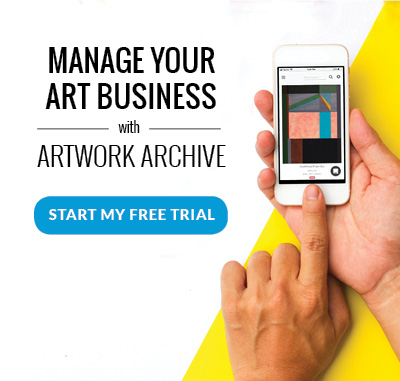 Artificial Communication by Sean Christopher Ward
Artificial Communication by Sean Christopher Ward
Do you inherently know that you are an artist? Or, do you decide to be one?
Since the Renaissance, the idea of “artist as genius”—an artist having innate abilities and capacities to create—has been a long-standing and, at times, a stifling stereotype.
It is true that artists are talented. It is also true that artists hone their ability to tune into and the produce uniquely from the world around them. However, the idea of “artist as genius” can make the artist experience an island.
Thinking of artists as born rather than created discounts the work and resolve of becoming a working artist. To a degree, we are all born with the potential to become artists; children are creators. Within every person is an ability and urge to create. Artists are the people who continued to create, tapping into this ability and urge.
When does one decide to continue a path of creativity? Is it a mindset? A natural inclination? A carefully crafted choice?
We were curious about dispelling the notion of the born artist. Our hypothesis is that having the confidence and drive to self identify and work as an artist is half of the battle of becoming an artist. While artists are no doubt talented and inspired, there is more to being an artist. It's more in deciding that you are an artist in the first place and then working to professionalize and grow a career.
We asked Artwork Archive artists, "did you know you were an artist or did you decide to be one?" Where do you fall within the spectrum of knowing and deciding to be an artist?
Five artists shared with us how they navigate their natural and decided artistic aspirations. For some, being an artist means they have actively chosen that path and others feel as though the path has chosen them.
Here's what they had to say.
 Installation of Jolie Laide by Lynn Basa
Installation of Jolie Laide by Lynn Basa
It's less about identifying and more about the strength to commit.
In retrospect, I've had the impulse to be an artist for as long as I can remember. Whether I was born that way or encouraged by my parents or both is hard to say. I was always making things and enjoyed that so much more than the other activities I was exposed to—so, yes, in some way I always knew I was an artist.
There was a definite point where I had to decide if I wanted to pursue it as a career, which I did when I was 19. At the school I attended, you had to declare a major between freshman and sophomore year. I actually took a semester off to think about it because I was so conflicted. One day it hit me like a thunderbolt that "art is a multi-billion dollar business and I'm not chopped liver." Those were actually the words that came to me. So I went for it and never looked back.”
I don't think I'm "talented." I see it more as a combination of personality traits and preferences that keep me committed to the work.
It's really more than identifying as an artist. I know a lot of people say it's a calling—like it's a religion. I wouldn't go that far, but it certainly takes a leap of faith. The ego-strength and risk-taking ability that an artist has to have has always fascinated me. I feel like I'm in a constant state of self-doubt, but when I zoom back and look at what it takes to do what I do, or any full-time artist does, there's a lot of strength there.
—Lynn Basa
@lynn.basa
Lynn is an artist living in Chicago. In addition to completing many public art commissions, she is an experimental painter. She taught in the Sculpture department at the School of the Art Institute of Chicago and exhibits internationally. Her work is a part of numerous corporate, museum, and private collections.
 Jamie Chiarello with her works in New Orleans.
Jamie Chiarello with her works in New Orleans.
Sustained curiosity carries you further than magical talent
Mostly I just knew that I wasn't satisfied by the world as I experienced it around me. When I couldn't find other representations that entirely reflected my experience, it produced a drive to create. All of my artistic gains in painting have been much more the byproduct of sustained curiosity that leads to more work rather than a well of magical talent.
I think art is more something you are inclined to and then you either lean into it more or more away from it. For myself—artistic sensibility has been more of a consistent thread, weaving through very broad areas of my life like friendships and jobs. In contrast, I think artistic practice is something very specific I have had to cultivate.
At this point, making a living as a street artist is one of the greatest joys in my life. Being able to turn paintings into groceries is a sustainable system at its most basic. Over the years, I have affirmed my practice by continuing to create while working other jobs. Having the opportunity to synthesize those two worlds just simplified everything enormously. As a single mother with a young child, it is a great relief to be able to say "I need to go paint" and be able to go take that time and know it will feed into practical needs.
—Jamie Chiarello
@namelessart2012
Jamie Chiarello is a self-taught painter originally from Richmond, Virginia. She made her home in New Orleans in 2004 and has found inspiration from the city itself. Her work is figurative, classically inspired, with a strong reliance on mark-making and imagination.
.png) Sean Christopher Ward
Sean Christopher Ward
You have to nurture your skills, regardless of talent
I come from a family of artists, so I started my training around the age of five, studying every possible medium my local schools offered! I began college as an art student, then switched to business school. I had such a longing to get back into a creative medium that I had to switch back to art school to finish out my degrees.
Some artists are inherently talented. However, any artist’s work does not truly become its greatest until you nurture your skill and develop it into something bigger. Even if you do not begin with talent, with enough hard work and constant effort to get better, you can definitely become something amazing!
The thing that makes me an artist is my ability to turn my thoughts into something physical to share with everyone around me. It’s about being able to unleash my creativity into anything I can make it into.
—Sean Christopher Ward
@seanchristopherward
Sean Christopher Ward is an interdisciplinary artist painting in the style of op art. Ward utilizes flat design to create depth and kinetic movement through strict hard edges and the utilization of masterfully placed colors side by side or next to negative space. He has artworks in over 500 permanent and private collections.
 Lordy Rodriguez at work Lake Tahoe by Lordy Rodriguez
Lordy Rodriguez at work Lake Tahoe by Lordy Rodriguez
The real challenge is how to continue being an artist
I decided to be an artist when I was in high school. I only realized in grad school that I didn't have to decide. I was always an artist. The real decision was whether or not I was going to try to make a living from art.
Art is one of the first languages we learn as children. It was the easiest language for me to communicate in, so it made sense that I would continue with it. I was drawn to the art world when in high school I learned about the artists that were making art in the early '90s (The YBAs, the lingering art stars from the '80s, and the burgeoning of installation and social practice art). Art is a true expression of our humanity. Just like how we develop as people, artistic talent is a combination of nature and nurture.
If you make art, you are an artist. It's not dictated by financial success or professional success. But if you don't make art, then you aren't an artist anymore. The challenging thing isn't how to be an artist. The challenging thing is how to keep being an artist.
It's important to have a space to make work. It doesn't have to be a physical space. It can also be a mental space. But that is probably what is most important for me in committing to myself as an artist and to my work.
@lordyrodriguez
Lordy Rodriguez is a contemporary artist, using cartography and maps to reconfigure factual locations through his fictional assemblages. Born in the Philippines, he is inspired both by his heritage and multinationalism. Rodriguez holds a Master’s in Fine Arts from Stanford University and is currently an assistant professor in Arts Entrepreneurship at San Jose State University.
 Big Fish Little Pond by Helvi Smith
Big Fish Little Pond by Helvi Smith
Nobody asked for documentation
I have always been creative but certainly did not call myself an artist until I started painting daily. I remember the first time someone asked, "What do you do" and I said, "I am an artist." I felt like I was bluffing but I just kept saying that I was an artist and of course, nobody asked for documentation.
I think the aspect of actively creating makes me an artist. Plus, I just call myself one.
Helvi Smith is a self-taught painter living in Forest Grove, Oregon. She is inspired by bright colors, mid-century shapes, and textures.
Making art is what makes you an artist
All interviewed artists felt connected to creating. Some were compelled to create by intentionally deciding to express their perspective and give it a visible place in the world. Others view their creative impulses as a nurtured and continued activity.
All artists saw creating within the lens of choice—choosing to pursue an art career or taking steps to professionalize or to continue to create.
Despite feeling called to art or feeling like self-created artists, taking on an artist's identity—establishing yourself as an artist—is the key to being one. It seems like identifying as an artist is in some ways as difficult and as continuous as taking the plunge and deciding to work as one.
What do you think? Is becoming an artist nature versus nurture, a decision or a calling?
What does taking on an artist's identity look like to you?



_(4).png?1658953058)

.png?1445061121)
